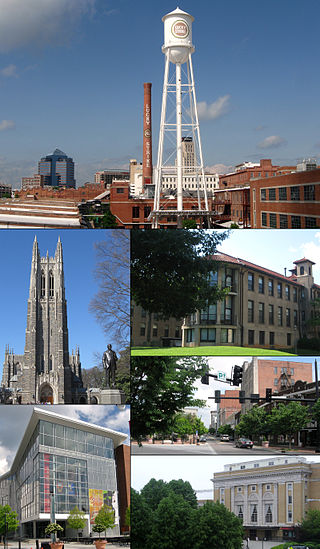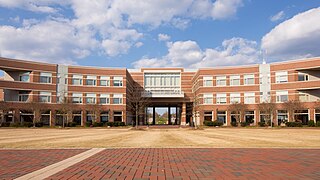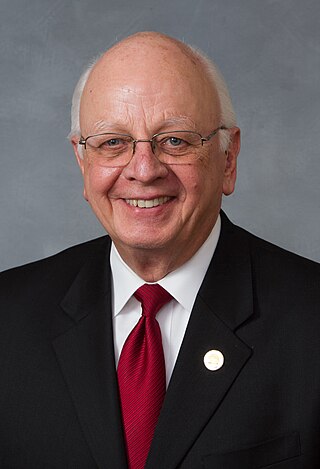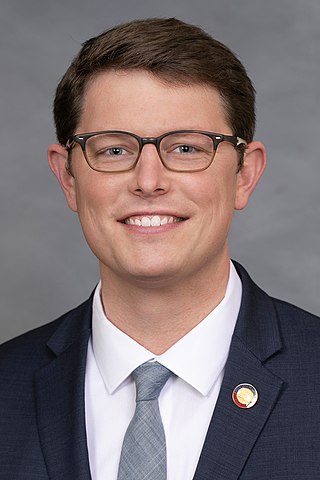Related Research Articles

North Carolina is a state in the Southeastern region of the United States. The state is the 28th largest and 9th-most populous of the United States. It is bordered by Virginia to the north, the Atlantic Ocean to the east, Georgia and South Carolina to the south, and Tennessee to the west. In the 2020 census, the state had a population of 10,439,388. Raleigh is the state's capital and Charlotte is its largest city. The Charlotte metropolitan area, with a population of 2,595,027 in 2020, is the most-populous metropolitan area in North Carolina, the 21st-most populous in the United States, and the largest banking center in the nation after New York City. The Raleigh-Durham-Cary combined statistical area is the second-largest metropolitan area in the state and 32nd-most populous in the United States, with a population of 2,043,867 in 2020, and is home to the largest research park in the United States, Research Triangle Park.

Wake County is located in the U.S. state of North Carolina. In the 2020 census, its population was 1,129,410, making it North Carolina's most-populous county. From July 2005 to July 2006, Wake County was the 9th-fastest growing county in the United States, with the town of Cary and the city of Raleigh being the 8th- and 15th-fastest growing cities, respectively.

Robbins is a city in Moore County, North Carolina, United States. The population was 1,097 at the 2010 census.

Durham is a city in the U.S. state of North Carolina and the county seat of Durham County. Small portions of the city limits extend into Orange County and Wake County. With a population of 283,506 in the 2020 census, Durham is the 4th-most populous city in North Carolina, and the 74th-most populous city in the United States. The city is located in the east-central part of the Piedmont region along the Eno River. Durham is the core of the four-county Durham-Chapel Hill Metropolitan Area, which had a population of 649,903 at the 2020 census. The Office of Management and Budget also includes Durham as a part of the Raleigh-Durham-Cary Combined Statistical Area, commonly known as the Research Triangle, which had a population of 2,043,867 at the 2020 census.

Research Triangle Park (RTP) is the largest research park in the United States, occupying 7,000 acres (2,833 ha) in North Carolina and hosting more than 300 companies and 65,000 workers.

The Research Triangle, or simply The Triangle, are both common nicknames for a metropolitan area in the Piedmont region of North Carolina in the United States, anchored by the cities of Raleigh and Durham and the town of Chapel Hill, home to three major research universities: North Carolina State University, Duke University, and University of North Carolina at Chapel Hill, respectively. The nine-county region, officially named the Raleigh–Durham–Cary combined statistical area (CSA), comprises the Raleigh–Cary and Durham–Chapel Hill Metropolitan Statistical Areas and the Henderson Micropolitan Statistical Area. The "Triangle" name originated in the 1950s with the creation of Research Triangle Park, located between the three anchor cities and home to numerous high tech companies.

The Southeastern United States, also referred to as the American Southeast or simply the Southeast, is a geographical region of the United States. It is located broadly on the eastern portion of the southern United States and the southern portion of the Eastern United States. It comprises at least a core of states on the lower East Coast of the United States and eastern Gulf Coast. Expansively, it reaches as far north as West Virginia and Maryland, and stretches as far west as Arkansas and Louisiana. There is no official U.S. government definition of the region, though various agencies and departments use different definitions.
Crabtree Valley Mall is a regional shopping mall located in Raleigh, North Carolina. At 1,343,109 square feet (124,778.9 m2), it is the largest enclosed mall in the Research Triangle area. Crabtree Valley contains over 200 stores and is anchored by Belk and Macy's.

The U.S. Army Combat Capabilities Development Command Army Research Laboratory is the U.S. Army's foundational research laboratory. ARL is headquartered at the Adelphi Laboratory Center (ALC) in Adelphi, Maryland. Its largest single site is at Aberdeen Proving Ground, Maryland. Other major ARL locations include Research Triangle Park, North Carolina, White Sands Missile Range, New Mexico, Graces Quarters, Maryland, and NASA's Glenn Research Center, Ohio and Langley Research Center, Virginia. ARL also has regional sites in Playa Vista, California, Chicago, Austin, TX, and Boston.

Research Triangle Institute, trading as RTI International, is a nonprofit organization headquartered in the Research Triangle Park in North Carolina. RTI provides research and technical services. It was founded in 1958 with $500,000 in funding from local businesses and the three North Carolina universities that form the Research Triangle. RTI research has covered topics like HIV/AIDS, healthcare, education curriculum and the environment, among others. The US Agency for International Development accounts for about 35 percent of RTI's research revenue.

The North Carolina Research Campus (NCRC) is a public-private research center in Kannapolis, North Carolina, United States. The Campus was envisioned by David H. Murdock, owner of Dole Food Company and Castle and Cooke, Inc., as a center for improving human health through research into nutrition and agriculture. The campus was formed and operates as a partnership with the State of North Carolina and the University of North Carolina system.

Centennial Campus is a research park and educational campus owned and operated by North Carolina State University in Raleigh, North Carolina, United States. Composed of two locations, the 1,334 acres (5.4 km2) property provides office and lab space for corporate, governmental and not-for-profit entities, in addition to providing space for 75 university research centers, institutes, laboratories and departmental units. Currently, 5,000,000 sq ft (460,000 m2) of constructed space has been built. Upon completion, Centennial Campus is anticipated to have 9,000,000 sq ft (840,000 m2) of constructed space.

NC*SA is the abbreviation for the North Carolina System Administrators organization, a non-profit educational group focused on providing useful information for System Administrators in North Carolina, United States. NC*SA is based in the Research Triangle area of North Carolina, with monthly meetings in Research Triangle Park, and receives the majority of its fundings from key sponsors.
On September 21, 2007, the graduate programs in North Carolina State University's College of Management were brought under one name - the Jenkins Graduate School of Management. The programs were named in honor of Benjamin (Ben) P. Jenkins, III, a 1968 graduate of the university and vice-chairman and president of the General Bank at Wachovia Corporation.

The Golden LEAF Foundation is a nonprofit corporation based in Rocky Mount, North Carolina in the United States, that was created in 1999 to receive half of the funds coming to North Carolina from the master settlement agreement with cigarette manufacturers. The foundation is now devoted to advancing the economic well being of North Carolinians and to transforming its economy. It works in partnership with local governments, educational institutions, economic development organizations and other public agencies, and nonprofits to achieve this goal.
In 2019, North Carolina's total gross state product was around $591 billion.
First Charter Bank, a subsidiary of First Charter Corporation, was a bank headquartered in Charlotte, North Carolina, United States. From its 1888 founding as Concord National Bank until its 2001 move to Charlotte, the bank was headquartered in Concord, North Carolina. The bank became part of Fifth Third Bank in 2008.

The Charlotte metropolitan area, sometimes referred to as Metrolina, is a metropolitan area of the U.S. states of North and South Carolina, within and surrounding the city of Charlotte. The metropolitan area also includes the cities of Gastonia, Concord, Huntersville, and Rock Hill as well as the large suburban area in the counties surrounding Mecklenburg County, which is at the center of the metro area. Located in the Piedmont, it is the largest metropolitan area in the Carolinas, and the fourth largest in the Southeastern United States. The Charlotte metropolitan area is one of the fastest growing metropolitan areas in the United States.

Joseph Aubrey "John" Faircloth Jr. is a Republican member of the North Carolina House of Representatives. He has represented the 62nd district since 2011. The district covers parts of western Guilford County.

Brian Austin Farkas is an American politician and State Representative serving District 9 in the North Carolina House of Representatives.
References
- ↑ North Carolina Governor's Office Press Release, Hunt Announces Establishment of Biotechnology Center as Independent Corporation, December 12, 1984.
- ↑ Link, Albery N. From Seed to Harvest: The Growth of the Research Triangle Park. Research Triangle Park: Research Triangle Foundation of America. (2002): 99-102.
- ↑ Basinger, Randy. "Biotechnology: 'New' Science Growing in the Park." North Carolina Beacon, 13 Jan. 1994: 7